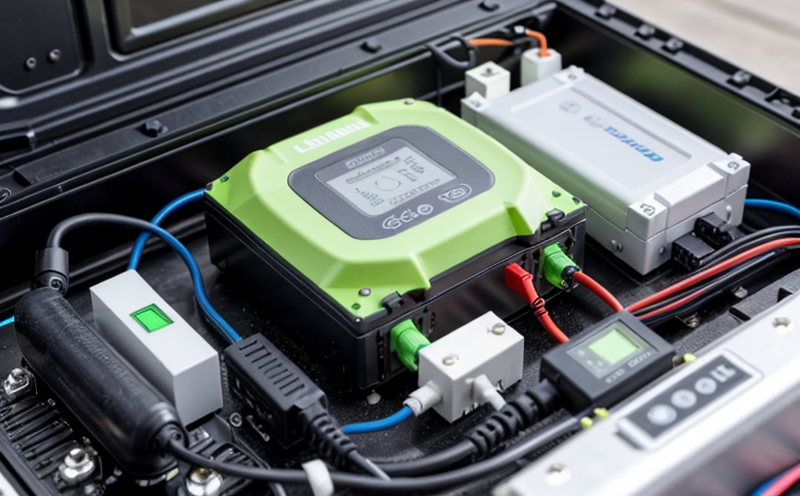KS C IEC 62619 Lithium-Ion Battery Testing for Industrial Applications
The Korean Standard (KS) C IEC 62619 is a crucial standard in the field of lithium-ion battery testing. This international standard ensures that batteries used in industrial applications meet stringent safety, performance, and durability requirements. In this service page, we delve into the intricacies of how our laboratory adheres to KS C IEC 62619 to provide comprehensive testing solutions for lithium-ion batteries.
Lithium-ion batteries are ubiquitous in various industries due to their high energy density, long cycle life, and low self-discharge rate. However, these benefits come with the challenge of ensuring safety during manufacturing, use, and disposal. KS C IEC 62619 addresses this by mandating tests that assess battery performance under a wide range of conditions, including temperature, vibration, overcharging, short circuits, and other stress factors.
Our laboratory employs state-of-the-art equipment to conduct these tests with precision and accuracy. From specialized charging stations to high-precision mechanical testers, we have the capability to simulate real-world scenarios that batteries encounter in industrial environments. This approach ensures that our clients receive reliable test results that can be trusted for regulatory compliance and product development.
The scope of KS C IEC 62619 covers a comprehensive set of tests designed to evaluate battery performance. These include:
- Thermal stability assessment
- Electrochemical performance evaluation
- Cycling endurance testing
- Short-circuit and overcharge resistance analysis
- Vibration tolerance examination
- Disposal compatibility verification
- Labeling and packaging integrity checks
Each test is conducted meticulously to ensure that the battery meets all specified criteria outlined in the standard. Our team of experts ensures that every step of the testing process adheres strictly to international standards, providing our clients with confidence in their products.
The methodology employed in KS C IEC 62619 Lithium-Ion Battery Testing involves a series of well-defined procedures designed to assess different aspects of battery performance. These procedures are validated through rigorous calibration and validation processes, ensuring that the results are accurate and reproducible.
Our laboratory utilizes advanced software tools to analyze test data and generate reports. These reports provide detailed insights into the battery's performance under various conditions, helping our clients make informed decisions about product design, manufacturing processes, and quality assurance measures.
The benefits of adhering to KS C IEC 62619 Lithium-Ion Battery Testing are numerous. Firstly, it enhances the safety profile of industrial lithium-ion batteries, reducing the risk of fires or explosions in hazardous environments. Secondly, it ensures consistent performance across batches, which is critical for maintaining operational efficiency in manufacturing processes.
Thirdly, compliance with this standard fosters trust among stakeholders, including regulators, customers, and investors. Fourthly, it facilitates easier market access by meeting the stringent requirements of various international markets. Lastly, it supports continuous improvement efforts through ongoing performance monitoring and analysis.
Scope and Methodology
The scope of KS C IEC 62619 Lithium-Ion Battery Testing is broad and encompasses a variety of tests aimed at assessing battery performance under different conditions. The testing process typically involves several key steps, each designed to evaluate specific aspects of the battery's capabilities.
Firstly, we conduct initial inspections to ensure that the batteries meet basic quality standards before proceeding with more rigorous tests. This includes visual inspections for any visible defects or anomalies. Secondly, we perform electrical characterization tests to determine the battery's internal resistance, impedance, and other electrical properties. These tests provide valuable insights into the battery's performance under load.
Thirdly, thermal stability assessments are carried out to evaluate how the battery responds to elevated temperatures. This is critical for ensuring that batteries can operate safely in high-temperature environments without compromising their integrity or performance. Fourthly, electrochemical performance evaluations involve deep discharge and charge cycles to assess the battery's ability to deliver consistent power output over time.
Fifthly, cycling endurance tests simulate real-world usage scenarios by subjecting the batteries to repeated charging and discharging cycles. This helps identify any potential weaknesses in the battery that could lead to premature failure. Sixthly, short-circuit and overcharge resistance analyses are conducted to ensure that the batteries can safely withstand unexpected power surges or prolonged exposure to excessive voltage.
Lastly, vibration tolerance examinations assess how well the batteries can withstand mechanical stress caused by vibrations during transportation or operation. This is particularly important for industrial applications where the battery may be subjected to rough handling or harsh environmental conditions. In addition, disposal compatibility verifications ensure that the batteries meet regulatory requirements for safe and environmentally friendly disposal.
The methodology employed in KS C IEC 62619 Lithium-Ion Battery Testing involves a series of well-defined procedures designed to assess different aspects of battery performance. These procedures are validated through rigorous calibration and validation processes, ensuring that the results are accurate and reproducible.





